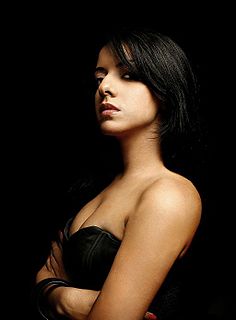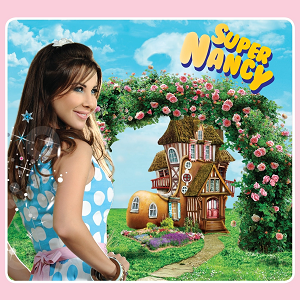
Nouhad Wadie' Haddad, known as Fairuz, also spelled Fairouz, Feyrouz or Fayrouz, is a Lebanese singer. She is considered by many as one of the leading vocalists and most famous singers in the history of Arab world. Fairuz is considered the musical icon of Lebanon, comparable to Edith Piaf in France, Elvis Presley in the United States and Lys Assia in Switzerland.

Haifa Wehbe is a Lebanese singer and actress. She has released seven studio albums, and made her acting debut in the 2008 Pepsi-produced film Sea of Stars. In 2006, Wehbe was on People Magazine's 50 most beautiful people list.
Salma Yā Salāma is an Egyptian popular song composed by musician Sayed Darwish for the 1919 play "Oulu lu". The song speaks about nostalgia for Egypt the warm homeland, about homesickness, and how the Egyptians are satisfied with life, whether they are poor or rich, and how brilliant they are in war and peace.

Najwa Karam is a Lebanese singer, songwriter, and fashion icon. Karam has created her own style which blends traditional and contemporary Arabic music and has helped spread the Lebanese dialect in Arabic music. Najwa Karam was the highest-selling Middle Eastern artist in 1999, 2000, 2001, 2003, and 2008. She is known for her vocal powerhouse Mawwal talents and has gained an international audience due to her distinct blend of traditional Lebanese music and contemporary sounds. In 2011, Karam debuted as a judge on the reality competition television series, Arabs Got Talent; she has since appeared on all six of its seasons. In 2017, Forbes Middle East ranked Karam number 5 on the list of "The Top 100 Arab Celebrities" with over 26.58 million social media followers. In 2018, Cosmopolitan included Karam on their list of "The 15 Most Inspiring Women In The Middle East", and Forbes included her on their list of the "Top 10 of Arab Stars On The Global Stage".
Haifa is an Israeli port city.
Bassem Feghali is a Lebanese comedian, singer and drag queen.
Arabic pop music or Arab pop music is a subgenre of pop music and Arabic music.
Studio El Fan was a Lebanese talent show broadcast on Télé Liban during the 1970s, and early 1980s, and Lebanese Broadcasting Corporation during the late 1980s, 1990s and early 2000s in Lebanon and throughout the Arab world. Like the Olympics, the show ran every four years for an entire calendar year. Contestants from all over Lebanon competed. The best contestants in the different singing categories were awarded gold, silver or bronze medals. In 1988, the show was bought by the Lebanese Broadcasting Corporation. In 2009, the show was bought again by Murr Television, and the show is currently airing with a whole new format.
Zaki Nassif was a Lebanese music composer and singer. He was influential among the first generation of composers for the mass audience for music on radio in Lebanon in the 1940s and 1950s, and continued to be a force in Lebanese music until his death in 2004. His compositions continue to be performed in Lebanon today.

Leila Kanaan is a Lebanese music video director and filmmaker. She has worked with famous Arab singers such as Nancy Ajram, Haifa Wehbe, Yara, Diana Haddad, Khaled, Myriam Fares and ect.

Habibi Ana is the fourth studio album from the Lebanese singer Haifa Wehbe released in 2008. The album contains 15 tracks. Haifa worked with various famous songwriters, composers, and arrangers on this album. The album contains the already three released singles, "Mosh Adra Astna", "Mat'olesh Lehad", and "Hasa Ma Bena". In the Middle East album sales struggled due to Haifa's lack of promotion as she was concentrating more on her acting and film career at the time.

Betfakkar Fi Eih is the sixth studio album by Lebanese singer Nancy Ajram. It was released on July 30, 2008 in the Arab World, and August 1 of the same year elsewhere through In2Musica, to reach remarkable career-defining success that none of Ajram's previous records had achieved.
Majdala, born Naziha Moukarzel was a Lebanese singer, mostly known for her work during the "Golden Age" of Lebanon, between 1952 and 1976.

Melissa is a Lebanese singer discovered by music producers Fady Bitar and Jean Saliba.

Malikat Jamal Al Kawn is the sixth studio album by Lebanese Arabic Pop singer Haifa Wehbe, released on May 8, 2012. The Album contains 14 songs, a fusion of oriental and western music sung in three different dialects: Egyptian, Lebanese and Gulf Arabic.

Super Nancy is the second children's album by Lebanese recording artist Nancy Ajram. It was released on September 13, 2012 by In2Musica and Arabica Music. Following the critical success of her debut album Shakhbat Shakhabit which was also exclusively oriented toward kids, Ajram decided to dedicate another record to them to show appreciation for their loyalty to her. The singer worked with several past collaborators she worked with in the previous kids album, while enlisting new ones. Super Nancy was well received by music critics. Three singles, which featured in the music video, were released in September 2012 from the album: "Ya Banat", "Stoohi", and "Baousi".

Jad Shwery is a Lebanese pop singer, songwriter and music video director.
Ehmej Festival is a music festival held annually in Ehmej, a municipality located about 57 km north of Beirut, in the Byblos District. The festival's aims are to boost tourism, promote the Lebanese culture, and spread music and art from Byblos to the rest of the Lebanese area.

Mike Massy is a Lebanese singer, songwriter, performer, composer, arranger, pianist and actor. Mike Massy plays the leading role in the French musical by Pascal Obispo and Christophe Barratier, produced by Sony Music and Holy Production. His discography combines more than 9 albums, numerous video clips, multiple musical shows, television series, short films and plays. He began his career in 2003 by releasing an album of spiritual hymns, Ila ssama atba’ouka, before founding his own label, Falak Productions. His debut album, Ya Zaman, was released in 2011 to critical acclaim, praising the nostalgic melodies of the East, the rigorous harmonies of baroque, and the elemental roots of jazz rhythms. A collaboration between 32 Lebanese and Belgian musicians, Ya Zaman peaked atop of the Lebanese charts, earning Massy the Murex d'Or for "Innovation in Music" in 2012. In 2017, Mike Massy released his first EP in French, entitled "Le Délire". This EP was a success in the World Music charts in Europe, as it reached Number 1 on "iTunes" in "Switzerland" and Number 3 in "France". In May 2018, Massy released his latest album “Bravo” comprising 9 tracks in Lebanese and literary Arabic, written and recorded between Brussels and Beirut. Mixing sharp lyrics with pop melodies, Mike Massy launches the challenge of a new sound. With a subtle blend of tradition and modernity, this album is the new positioning of Mike Massy, who manages the transition from traditional to modern with astonishing ease.











